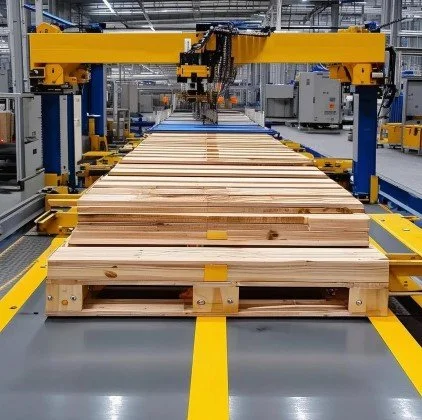Future of Pallets
The Future of Pallet Manufacturing: Trends to Watch in 2025 and Beyond
As industries across the globe continue to evolve, so does the pallet manufacturing industry. Pallets, though often overlooked, are critical to the logistics and supply chain processes that keep goods moving efficiently around the world. With technological advancements, growing environmental concerns, and changes in global trade dynamics, the pallet manufacturing industry is poised for significant transformations in the coming years. This article explores the key trends that will shape the future of pallet manufacturing in 2025 and beyond.
1. Automation and Robotics in Pallet Manufacturing
Automation is revolutionizing many industries, and pallet manufacturing is no exception. The use of robotics and automated systems in pallet production is set to increase, leading to higher efficiency, reduced labor costs, and improved product consistency.
Automated Assembly Lines: Robotics can handle repetitive tasks such as nailing and cutting, speeding up the production process and reducing the likelihood of human error. Automated assembly lines can produce large volumes of pallets with precise specifications, ensuring uniformity and quality.
Smart Manufacturing: The integration of IoT (Internet of Things) devices into manufacturing processes allows for real-time monitoring and data collection. This data can be used to optimize production, predict maintenance needs, and reduce downtime, leading to more efficient operations.
2. Sustainability and Eco-Friendly Materials
Sustainability has become a significant focus for businesses worldwide, and the pallet manufacturing industry is no different. As environmental regulations tighten and consumers demand greener products, manufacturers are exploring new materials and processes to reduce their environmental impact.
Recycled and Recyclable Materials: The use of recycled wood and plastics in pallet production is expected to grow. These materials not only reduce the need for virgin resources but also offer end-of-life recycling options, supporting a circular economy.
Biodegradable Pallets: Research is underway into biodegradable materials that can be used to create pallets. These pallets would decompose naturally at the end of their lifecycle, reducing landfill waste and minimizing environmental impact.
3. The Rise of Smart Pallets
The future of pallet manufacturing will also see the rise of "smart pallets" equipped with advanced technology to enhance their functionality within the supply chain.
RFID and GPS Tracking: Smart pallets equipped with RFID chips and GPS trackers provide real-time data on the location, condition, and movement of goods. This technology enables better inventory management, reduces the risk of loss or theft, and improves overall supply chain visibility.
Condition Monitoring: Advanced sensors embedded in smart pallets can monitor environmental conditions such as temperature, humidity, and shock during transport. This is particularly valuable for industries like pharmaceuticals and food, where maintaining specific conditions is crucial for product integrity.
4. Customization and On-Demand Manufacturing
As businesses demand more specialized solutions, customization and on-demand manufacturing are becoming increasingly important in the pallet industry.
Custom Pallet Design: Manufacturers are investing in technology that allows for greater customization of pallets to meet specific industry needs. This includes the ability to quickly design and produce pallets that accommodate unique product dimensions, weight requirements, and handling conditions.
On-Demand Production: Advances in manufacturing technology, such as 3D printing and modular production systems, are making it possible to produce pallets on-demand. This reduces inventory costs and allows businesses to order pallets that meet their exact specifications, delivered just in time for use.
5. Global Supply Chain Resilience
The COVID-19 pandemic exposed vulnerabilities in global supply chains, leading to a renewed focus on resilience. Pallet manufacturers are playing a key role in this shift by developing solutions that enhance supply chain flexibility and reliability.
Localized Production: To mitigate the risks associated with global disruptions, some companies are moving towards localized pallet production. This reduces dependence on long-distance shipping and ensures that pallets are available when and where they are needed most.
Adaptable Pallet Designs: Manufacturers are creating pallets that can be easily adapted for different products and transport methods. This flexibility allows businesses to respond quickly to changes in demand and supply chain conditions, ensuring continuity of operations.
Call to Action: Embrace the Future with Heritage Pallet of Georgia
As the pallet manufacturing industry evolves, it's essential to partner with a manufacturer that stays ahead of the trends. At Heritage Pallet of Georgia, we are committed to innovation, sustainability, and quality. Whether you're looking for cutting-edge smart pallets, eco-friendly materials, or customized solutions, we have the expertise to meet your needs.
Ready to future-proof your supply chain? Visit our Get a Quote page to request a personalized quote and learn more about how our forward-thinking pallet solutions can benefit your business. Let Heritage Pallet of Georgia help you navigate the future of pallet manufacturing with confidence. Contact us today!
